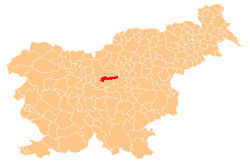Dupeljne
| Dupeljne | |
|---|---|
 Dupeljne Location in Slovenia | |
| Coordinates: 46°11′30.88″N 14°40′34″E / 46.1919111°N 14.67611°ECoordinates: 46°11′30.88″N 14°40′34″E / 46.1919111°N 14.67611°E | |
| Country |
|
| Traditional region | Upper Carniola |
| Statistical region | Central Slovenia |
| Municipality | Lukovica |
| Area | |
| • Total | 0.67 km2 (0.26 sq mi) |
| Elevation | 544.3 m (1,785.8 ft) |
| Population (2002) | |
| • Total | 51 |
| [1] | |
Dupeljne (pronounced [ˈduːpəlnɛ]) is a small settlement in the hills north of Lukovica in the eastern part of the Upper Carniola region of Slovenia.[2]
Name
Dupeljne was first attested in written sources in 1348 as Tewpplach (and in 1353 as zu dem Dupelnik). The old transcriptions are based on locative a plural form, probably based on the plural demonym *Dupljane. The name is derived from the Slovene common noun dupel 'hollow', referring to a local geographical feature.[3]
History
Dupeljne was mentioned in Johann Weikhard von Valvasor's 17th-century work The Glory of the Duchy of Carniola. He described the local people as speaking a slow dialect and being deliberate thinkers. During the Second World War, locals from Dupeljne helped care for wounded Partisan soldiers and supplied the Partisans' Triglav Hospital (a.k.a. Luk Hospital, Slovene: Lukova bolnica) near Kolovec. On 13 December 1942, German forces attacked a detachment of Partisans from Kamnik between Kolovec and Dupeljne, who then withdrew to Dupeljne.[4]
Notable people
Notable people that were born or lived in Dupeljne include:
- Jakob Grčar (1889–1966), journalist and singer[4]
References
- ↑ Statistical Office of the Republic of Slovenia
- ↑ Lukovica municipal site
- ↑ Snoj, Marko. 2009. Etimološki slovar slovenskih zemljepisnih imen. Ljubljana: Modrijan and Založba ZRC, p. 129.
- 1 2 Savnik, Roman, ed. 1971. Krajevni leksikon Slovenije, vol. 2. Ljubljana: Državna založba Slovenije, p. 85.
